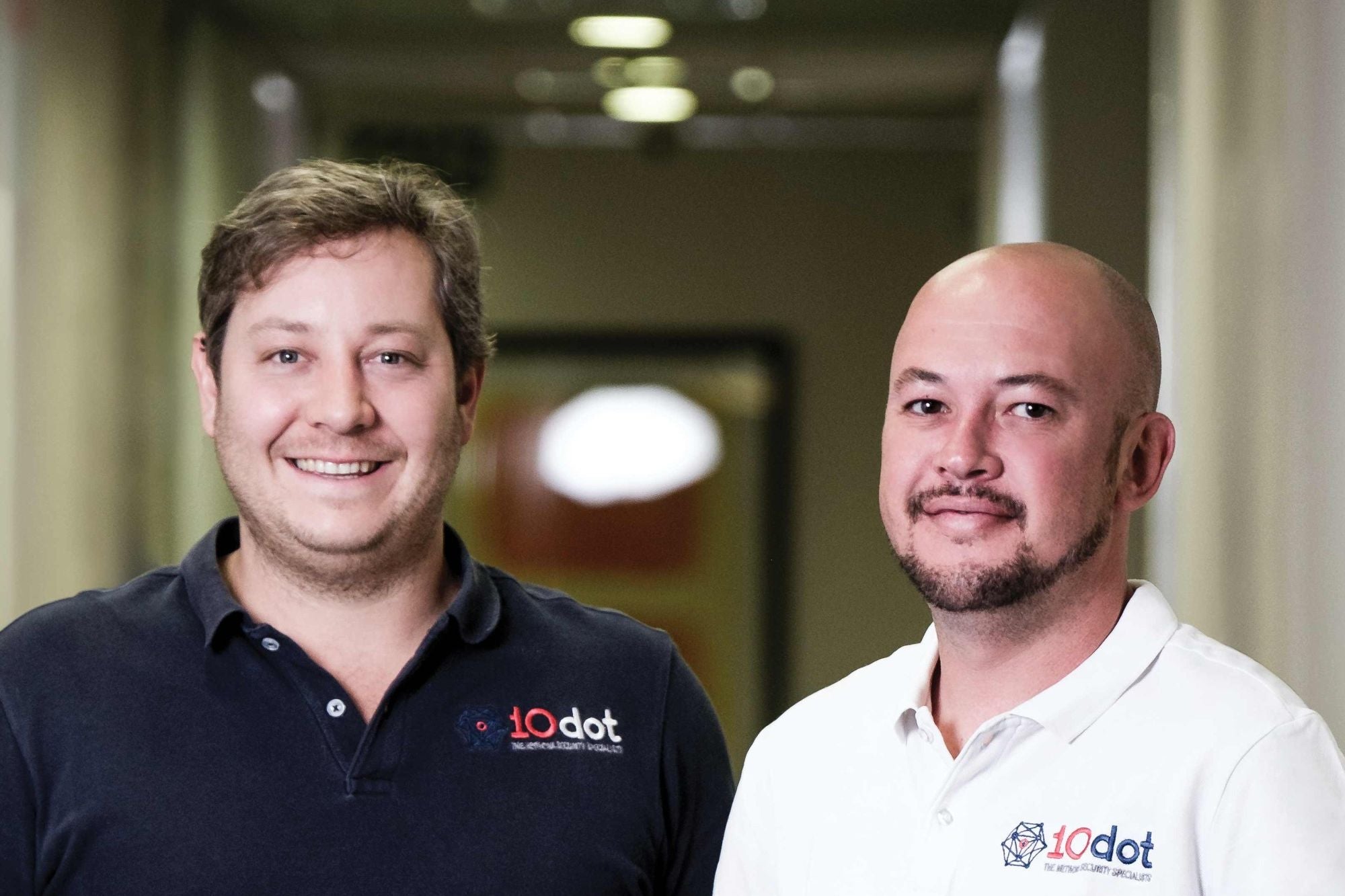How To Sell a Complex Product in a Tough Market 10dot is a young company competing in the technical and competitive field of Internet security. Founders Jared van Ast and Donovan Strapp discuss the secrets to selling a complex product in a tough market.
Opinions expressed by Entrepreneur contributors are their own.
You're reading Entrepreneur South Africa, an international franchise of Entrepreneur Media.

Vital stats
- Players: Jared van Ast and Donovan Strapp
- Company: 10dot
- Established: 2014
- Visit: www.10dot.com
For many people, cyber security management is a confusing and daunting field. It can be over-complicated and under-delivered, and many business owners aren't entirely sure what their own security needs are. So, a company like 10dot is often faced with the opportune task of explaining what exactly its value proposition is.
There are some large and established names in the field, and there are plenty of others competing aggressively on price, so how does a relatively young business set itself apart?
Here are 10dot founders Jared van Ast and Donovan Strapp's lessons on surviving (and thriving) in a tough but exciting field.
1. Solve problems in English
"The cyber security industry is a good example of a highly technical field that suffers from diffused and unfocused messaging. Working in the field as a corporate employee, I noticed a few core issues. Clients don't understand the jargon and acronyms, or even the value proposition being offered to them and their businesses. We recognised there was a gap for a business that could speak English to its clients, and solve problems with transparency. We want to speak our clients' language, not force them to understand our industry-speak," says Jared.
Regardless of the industry you're in, it's important to remember that at the end of the day, you're selling to people. "Don't confuse potential clients with loads of tech-talk. Keep it simple," he maintains.
"Learn to tell a relatable story. If you're able to show clients why network security is an important consideration within their business context, you can then take them on a journey of how you can help — but you need to outline the problem and the cost of the problem first. To keep ourselves on point, and to ensure we don't slip into tech-jargon, we have loads of made-up sayings at 10dot. One of them is "Grannify', which basically means that an idea and its execution needs to be so simple that even a grandmother can grasp it and find it engaging."
2. Focus on branding
"Branding is crucial when launching a business," says Jared. "Without an engaging brand, you don't have much to market — you need to stand out from your competitors and build credibility as quickly as possible."
"Right from the beginning, we decided to create a brand that shakes things up a bit," agrees Donovan. "When we built our website, we researched competitor sites so that we could ensure we are different. We needed to make our offerings clear so that our subject matter, and most importantly, who we are would resonate with people."
For 10dot, this has meant a clear brand strategy across all their channels, from the language they use with clients, to how they unpack their offerings on their website, with a slick, "cool' look and feel, making cyber security accessible, rather than impenetrable.
3. Listen
"Before you start talking during a meeting, first listen. The best way to sell is to understand the needs of your clients. Let them tell you what they want and need. Try to gain a deep understanding of their business and context," says Jared.
"You'll sometimes sit across from clients who don't really grasp your product or even your industry. They don't really understand their own needs or how you can help them. By listening, you can provide a solution that fits their business and their specific needs."
Donovan agrees. "Once we get a meeting with clients, we tend to make a successful sale, predominantly because we listen to them and understand their context in detail. We can't craft a bespoke and tailored solution without that understanding," he says.
4. Be a trusted advisor
"Ultimately, we want to become that trusted advisor whom a client turns to when it comes to all things "network security' related," says Donovan. "When clients hear about recent hacking victims in the world press, they should feel comfortable calling us first. We are the specialists, the thought leaders. We don't want a purely transactional relationship with our clients."
Becoming a trusted advisor means you have to give before you receive. You have to have your client's best interests at heart, and offer advice where appropriate, even beyond the scope of your current contract. Trusted advisors become de facto members of the team, rather than just suppliers. Once you can develop a relationship like that, you secure real client loyalty as well.
5. Show value from day one
When it comes to retaining clients, nothing is better than being able to show relevant value in an integrated way, right out of the gate. "In many ways this is a commoditised industry, and so we focus on solving business problems with compounding value. Get this right, and you don't have to compete on price," says Jared.
"Metrics can be useful in this regard, especially if you have a dashboard that makes this information easy to access and understandable for clients."
However, metrics alone won't get the job done. "You also need to ensure that the information isn't overwhelming. A 200-page report is useless. No one has the time to sift through that much data. Instead, crucial information should be understandable at a glance. All elements of the cyber-security mix need to be integrated and usable," says Donovan.
"Integrated value drives everything at 10dot, from product design to client engagement," adds Jared.
"Everything we do must be engaging, intuitive, and create relevant value for our clients and their business. We don't let anything leave our desks if it doesn't tick those boxes."
6. Have a fluid strategy
If you want to grow and bring on more clients, you need a fluid strategy and defined tactics. "Having matured into "scale-up phase', growth is our number one priority right now, so Donovan and I have a very structured planning and forecasting regime. That said, it's important to be agile and willing to adapt. We've learnt that your strategy will need to change. We focus on having about 65% of our strategy in place. The rest is dependent on how situations evolve. Agility is one of the major advantages that you have as a scale-up, so it's important not to rob yourself of it. Have a strategy of course, but also be willing to change it up a little. Have some fun."
Take note
Branding is everything. Pay attention to your business story and what the market knows and understands about who you are and what you can do for them.











